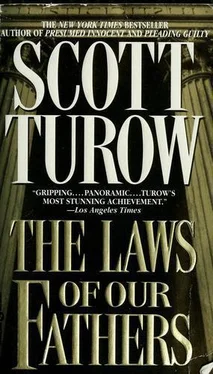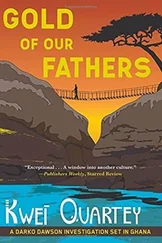Scott Turow - The Laws of our Fathers
Здесь есть возможность читать онлайн «Scott Turow - The Laws of our Fathers» весь текст электронной книги совершенно бесплатно (целиком полную версию без сокращений). В некоторых случаях можно слушать аудио, скачать через торрент в формате fb2 и присутствует краткое содержание. Жанр: Криминальный детектив, на английском языке. Описание произведения, (предисловие) а так же отзывы посетителей доступны на портале библиотеки ЛибКат.
- Название:The Laws of our Fathers
- Автор:
- Жанр:
- Год:неизвестен
- ISBN:нет данных
- Рейтинг книги:5 / 5. Голосов: 1
-
Избранное:Добавить в избранное
- Отзывы:
-
Ваша оценка:
- 100
- 1
- 2
- 3
- 4
- 5
The Laws of our Fathers: краткое содержание, описание и аннотация
Предлагаем к чтению аннотацию, описание, краткое содержание или предисловие (зависит от того, что написал сам автор книги «The Laws of our Fathers»). Если вы не нашли необходимую информацию о книге — напишите в комментариях, мы постараемся отыскать её.
The Laws of our Fathers — читать онлайн бесплатно полную книгу (весь текст) целиком
Ниже представлен текст книги, разбитый по страницам. Система сохранения места последней прочитанной страницы, позволяет с удобством читать онлайн бесплатно книгу «The Laws of our Fathers», без необходимости каждый раз заново искать на чём Вы остановились. Поставьте закладку, и сможете в любой момент перейти на страницу, на которой закончили чтение.
Интервал:
Закладка:
I'd found my job with Nile purely by accident. The day we moved in, I knocked on the door to the single upstairs flat, looking for a hammer, and was greeted by Nile's father, Loyell Eddgar, whose movie-star looks undoubtedly contributed to his charisma. He was a slighter, shorter version of Bruce Jenner, an Olympic athlete of the day, with the same long, lank hair smoothly groomed, and a similar Barbie doll handsomeness. I was struck by his eyes, a remarkable limpid blue, which gave him the pale haunted gaze of a mystic. Eddgar, however, had none of a jock's relaxed way – he was rigid as someone taking an electrical shock. As I explained what I needed, he stood his ground in the threshold and clearly would have slammed the door on me had it not been for a mild Southern voice behind him. A pleasant-looking woman in jeans and a chambray shirt approached, her stiff, bronze hair ponytailed, her measured smile reflecting self-control and excellent breeding.
'Will you sit?' June Eddgar asked, as soon as we'd made our introductions. As it turned out, this was a job offer, rather than an effort to improve on Eddgar's congeniality. June explained that both she and her husband, a theology professor at Damon, worked full-time. Their former baby-sitter, our neighbor downstairs, Michael Frain, had quit unexpectedly only the day before in order to supervise a lab in the Applied Research Center. She was, frankly, desperate, and hoped I could step in with Nile, after school and on some evenings.
The notion of me as a baby-sitter seemed slightly preposterous. I had no younger siblings and naturally thought of it as girls' work. On the other hand, I was without any means of support at that point, which meant, even halfway across the country, I felt myself vulnerable to my father and his perpetual craziness about money. He was an economist, one of the first of the money-supply experts, whose lifework – his very consciousness – was given over to money, which, as a result, was the frequent terrain of our many conflicts.
Only after I accepted June's offer did I find out what I had gotten myself into. 'Oh, lad. You're a flippin employee of the chairman of One Hundred Flowers,' I was informed that night by Sonny's departmental adviser, Graeme Florry. We were at the first of what I quickly came to regard as dreadful events, the departmental party, where the grad students chattered brightly and sized each other up. Graeme, a tall ruddy Englishman with a blond pageboy, wore a skinny Jacob's beard fringing his jaw and narrow yellow-tinted granny glasses suggestive of some psychedelic orientation. I had no idea what he meant by One Hundred Flowers or why he seemed so agitated.
'Ask the FBI, mate, Damon security, the town police. Know One Hundred Flowers well, I reckon. Refer to themselves as a "revolutionary council," I believe. The Black Panthers. White Panthers. Weathermen. PLP. The Brown Berets. Everybody, love. The Red Mountain Tribe. Honkies for Huey. Each little root and seed group, all the various head cases who begin nodding vigorously when anyone starts talking about taking up weapons. A treacherous fellow, that one. Believe me. Ordered an execution last year. Did you know that? Word from some poor devil who was involved. God, I hope you're not with the FBI.'
I assured him I wasn't. Graeme took another belt of his whiskey to still his concerns.
' Someone from the Panthers they took for an informant. Coppers found him in a ditch down by the Bay. Injected the poor chap with heroin, forcibly, tucked a wee bit of powder in his pocket so the police would think it was a junkie overdose. Not give a bloody damn. Which they didn't.'
Graeme briefly sketched Eddgar's history. He was the scion of Southern planters – his grandfather had been raised with slaves – a background of gentility and greed which Eddgar freely acknowledged and regularly denounced. He was an ordained minister and, until he had tenure, had been a promising professor in the School of Divinity, with a scholarly interest in comparing the teachings of the Gospels to Marxist doctrine. But after freedom riding and lunch-counter sit-ins in the mid-sixties, he had begun adhering more to Chairman Mao's Little Red Book than the Scriptures. Through his radical organization, Eddgar was suspected of inspiring riots the prior spring, when separate groups of black and white students occupying university buildings had been ej ected by a phalanx of city cops, culminating in the wounding of a university guard who had been shot from across the main quad.
In those first days, Sonny heard the same things about the Eddgars – that they had taken part in planning the prison breakout at Soledad, that a faction in the faculty senate wanted to expel Eddgar from the university – and she repeatedly urged me to quit. Sonny herself was a red diaper baby, daughter of a labor organizer named Zora Klonsky, who briefly, during World War II, had served as president of a Kindle County pipefitters' local. I viewed Zora more prosaically, as the only real-live Commie I'd ever met, and – in utter privacy – a serious nut. But whatever her sanity, Zora was a unionist. She'd broken factory windows but never staged a prison breakout, never fired a gun. The Eddgars were too much for Sonny.
'They're into very heavy stuff' Sonny warned. I was unconcerned. For one thing, I had learned that first day, as June was vetting me, that both the Eddgars were Easton graduates, fugitive Southerners who'd endured four years of Midwestern winters. I sentimentally assumed that made for a bond that would keep me safe. Beyond that, I was intrigued. Given the dismal results produced by the political process the year before – the police riot outside the Democratic convention; Richard Nixon's election and his subsequent refusal to bring the war to a close – many people on the left argued that it was time to move beyond civil protests to militant action. In Manhattan, bombs had decimated the Armed Forces induction station on Whitehall Street and the criminal courts building. SDS, the most prominent left-wing organization on many campuses, had splintered over the issue of violence, and in the fall of '69, the surviving Weatherman faction staged the Days of Rage in Chicago, in which dozens of rads ransacked the streets, smashing auto windows with case-hardened chains and going hand to hand with police. In Southern California, Juanita Rice, the daughter of a prominent industrialist and Republican fund-raiser, was grabbed at gunpoint out of her high school by some cadre called the Liberation Army, who held her for ransom. I regarded these actions as counterproductive and extreme, but I couldn't stifle a spark of excitement at the notion of reshaping the world from scratch. Amid my sense of wandering, dangling, the Eddgars seemed to represent reality, life, the thing I still felt was waiting to start.
Over the years I've wondered of course why it didn't work out between Sonny and me. The times? Did I frighten her with all my crazy passions? Did I cling? Insight, like some sweet inspiration, remains temptingly beyond reach. But somehow living together was hard. The carrying through. The day to day. Neither of us really had the remotest idea how to be with someone else. Sonny's mother, Zora, hadn't lived with a man while Sonny was alive, and from an early age I'd known that my parents' high-strung, suffocated relationship was something I did not want to duplicate. As a result, virtually everything between us was definitional: who did the wash, who made the social plans, how clean to keep the apartment. We fought about it all.
And some of what emerged couldn't be dismissed as mere adjustment. I regarded the girl I'd been dating as the most 'together' person I knew, thoroughly and enviably adult. Sonny was poised and rigorously logical in all circumstances, while maintaining a warm, frank manner. She was quick to laugh at jokes, if poorer at making them, easy with strangers, kind to street people and their dogs. My principal contribution to her, so far as I figured, was to add a combustible element to a life that was a little too confined by deliberation.
Читать дальшеИнтервал:
Закладка:
Похожие книги на «The Laws of our Fathers»
Представляем Вашему вниманию похожие книги на «The Laws of our Fathers» списком для выбора. Мы отобрали схожую по названию и смыслу литературу в надежде предоставить читателям больше вариантов отыскать новые, интересные, ещё непрочитанные произведения.
Обсуждение, отзывы о книге «The Laws of our Fathers» и просто собственные мнения читателей. Оставьте ваши комментарии, напишите, что Вы думаете о произведении, его смысле или главных героях. Укажите что конкретно понравилось, а что нет, и почему Вы так считаете.












